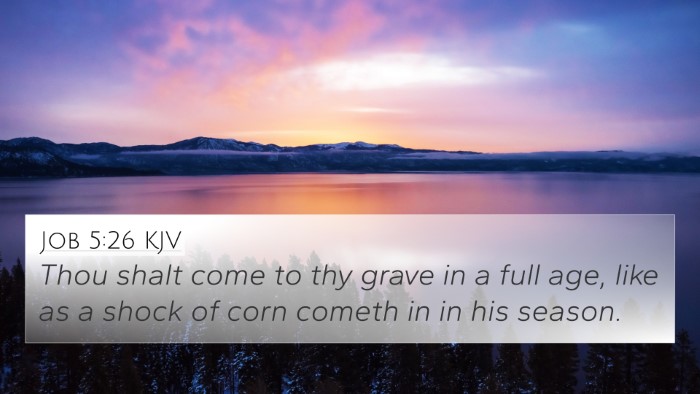Old Testament
Genesis Exodus Leviticus Numbers Deuteronomy Joshua Judges Ruth 1 Samuel 2 Samuel 1 Kings 2 Kings 1 Chronicles 2 Chronicles Ezra Nehemiah Esther Job Psalms Proverbs Ecclesiastes Song of Solomon Isaiah Jeremiah Lamentations Ezekiel Daniel Hosea Joel Amos Obadiah Jonah Micah Nahum Habakkuk Zephaniah Haggai Zechariah MalachiJob 42:17 Similar Verses
Job 42:17 Cross References
So Job died, being old and full of days.
Uncover the Rich Themes and Topics of This Bible Verse
Listed below are the Bible themes associated with Job 42:17. We invite you to explore each theme to gain deeper insights into the Scriptures.
Job 42:17 Cross Reference Verses
This section features a detailed cross-reference designed to enrich your understanding of the Scriptures. Below, you will find carefully selected verses that echo the themes and teachings related to Job 42:17 KJV. Click on any image to explore detailed analyses of related Bible verses and uncover deeper theological insights.

Genesis 25:8 (KJV) »
Then Abraham gave up the ghost, and died in a good old age, an old man, and full of years; and was gathered to his people.

Genesis 15:15 (KJV) »
And thou shalt go to thy fathers in peace; thou shalt be buried in a good old age.

Job 5:26 (KJV) »
Thou shalt come to thy grave in a full age, like as a shock of corn cometh in in his season.

Deuteronomy 6:2 (KJV) »
That thou mightest fear the LORD thy God, to keep all his statutes and his commandments, which I command thee, thou, and thy son, and thy son's son, all the days of thy life; and that thy days may be prolonged.
Job 42:17 Verse Analysis and Similar Verses
Understanding Job 42:17
Job 42:17: "So Job died, being old and full of days."
This verse marks the conclusion of the Book of Job, encapsulating both the end of Job's sufferings and the culmination of his life. It signifies not just the death of Job but also the fulfillment of his life experiences and the restoration he underwent after intense trials. Below, we explore the layered meanings of this verse through insights derived from public domain commentaries.
Insights from Commentaries
-
Matthew Henry:
Henry underscores that Job's death at an old age symbolizes a life full of wisdom, blessings, and divine favor. After experiencing immense suffering, Job's later years were filled with prosperity, marking a transformative closure to his story.
-
Albert Barnes:
Barnes highlights that Job’s life was extended and enriched after his trial, pointing out that 'full of days' indicates a life that not only endured hardship but also received God’s blessings, demonstrating that faithfulness in suffering can lead to divine reward.
-
Adam Clarke:
Clarke explains that this verse reflects the character of Job as a believer who remained steadfast throughout his affliction. His old age is an emblem of the reward for patience and fidelity in faith, showing that enduring trials with integrity yields God's acknowledgment and reward.
Thematic Connections
This verse serves as a lens to explore various themes present throughout the Bible, especially regarding suffering, divine justice, and the restoration of faith. Here are some cross-references that illustrate these connections:
- James 5:11: “Behold, we consider those blessed who remained steadfast. You have heard of the steadfastness of Job, and you have seen the purpose of the Lord, how the Lord is compassionate and merciful.”
- Psalm 139:16: “Your eyes saw my unformed substance; in your book were written, every one of them, the days that were formed for me, when as yet there was none of them.”
- Proverbs 3:2: “For length of days and years of life and peace they will add to you.”
- Ecclesiastes 7:8: “Better is the end of a thing than its beginning, and the patient in spirit is better than the proud in spirit.”
- Isaiah 46:4: “Even to your old age I am he, and to gray hairs I will carry you. I have made, and I will bear; I will carry and will save.”
- Revelation 14:13: “And I heard a voice from heaven saying, 'Write this: Blessed are the dead who die in the Lord from now on.'”
- 1 Peter 5:10: “And after you have suffered a little while, the God of all grace, who has called you to his eternal glory in Christ, will himself restore, confirm, strengthen, and establish you.”
Inter-Biblical Dialogue
The conclusion of Job's narrative exemplifies themes of perseverance, God's sovereignty, and the rewards of faith. It invites readers to engage in comparative Bible verse analysis regarding suffering and divine resolution. By linking Job's experience with other biblical figures who endured hardship—such as Joseph, Moses, and Paul—we can gain a fuller understanding of God's plan throughout the Scripture.
Tools for Bible Cross-Referencing
Utilizing cross-references can provide deeper insights into passages in the Bible. Tools for Bible cross-referencing, such as concordances and Bible study guides, allow believers to explore the connections and parallels within Scripture efficiently.
For example:
- Identify connections between the Old and New Testament through themes of suffering and restoration.
- Use a Bible concordance to find cross-references that relate to this verse, enhancing your study experience.
- Engage with cross-reference Bible study methods to understand interactions between similar themes throughout different books of the Bible.
Conclusion
The final verse of Job serves not only as a closure to a profound story but also as a springboard for reflective study of faith, endurance, and divine providence. By engaging with the insights from various commentaries and utilizing effective Bible reference resources, believers can find encouragement and wisdom that resonates with their own life journeys.




